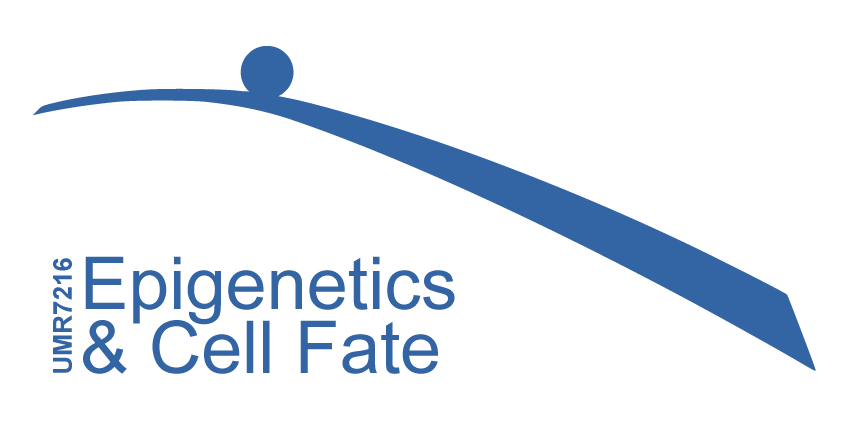Mezger group
Interface between Development and Environment
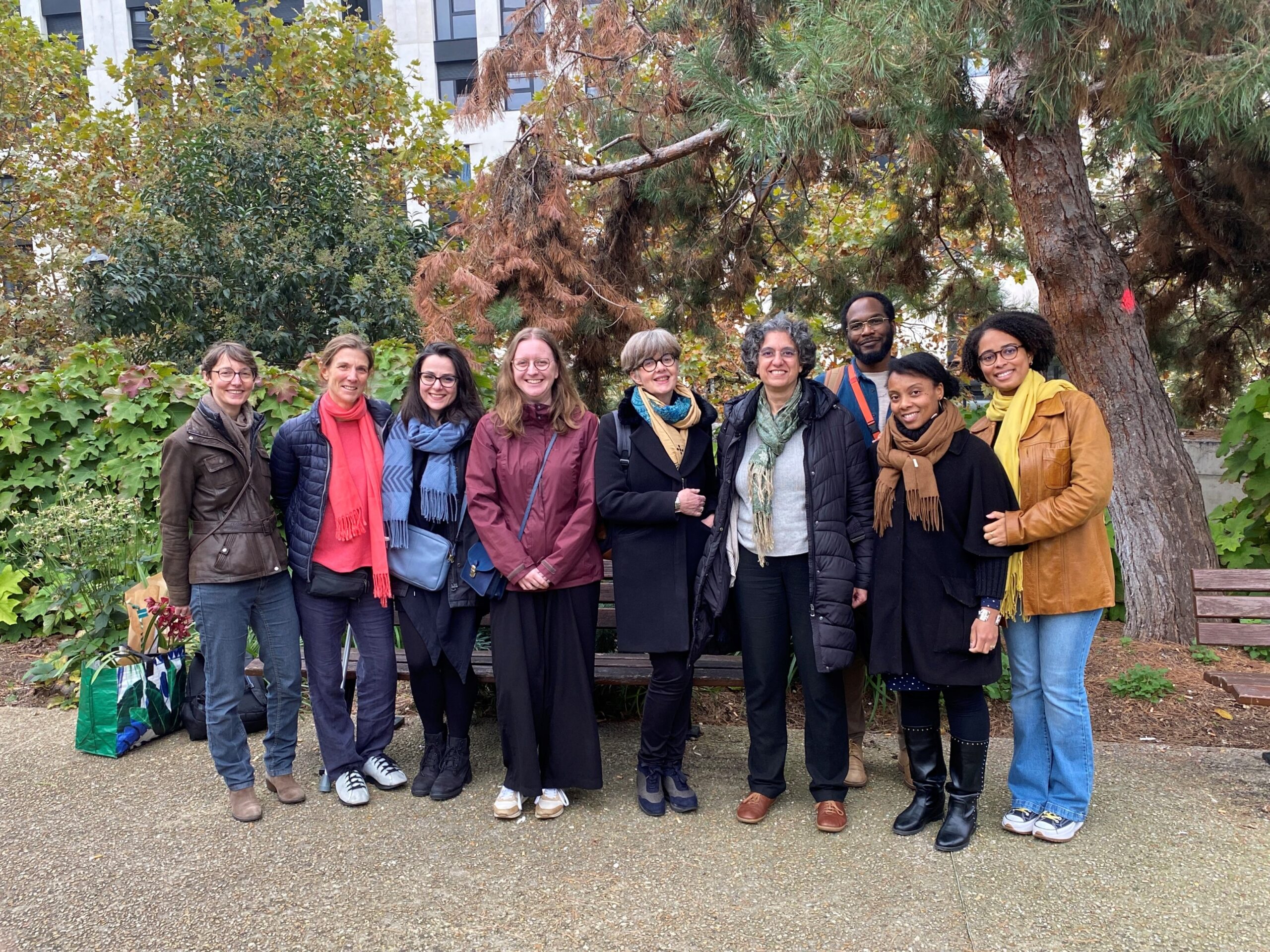
Mezger team
November 2024
© Mezger team 2024
Our main goals
Our team focuses on the link between brain development and integrity and stress responses under normal conditions and environmental stress. We aim at understanding the interactions between the cellular stress responses and the epigenetic and transcriptional regulations taking place in the healthy or diseased developing brain.
Over the years, we have found that stress-responsive factors are unexpectedly active and necessary for brain development, under physiological conditions. This turn them into main drivers of neurodevelopmental defects under prenatal stress conditions. Moreover, we found that stress-responsive pathways are also perturbed in models of neurodevelopmental disorders of genetic origins, making them attractive potential target for future therapeutic approaches.
Our current research topics
Our interests follow two main research axes:
- To clarify the role of HSF2, a member of the HSF family, and that of other stress-responsive transcription factor pathways, in the brain development and as mediators of some of the defects occurring in neurodevelopmental pathologies
- To clarify how prenatal stress impacts the reorganization of the neuro-epigenome and the transcriptome and causes neurodevelopmental defects
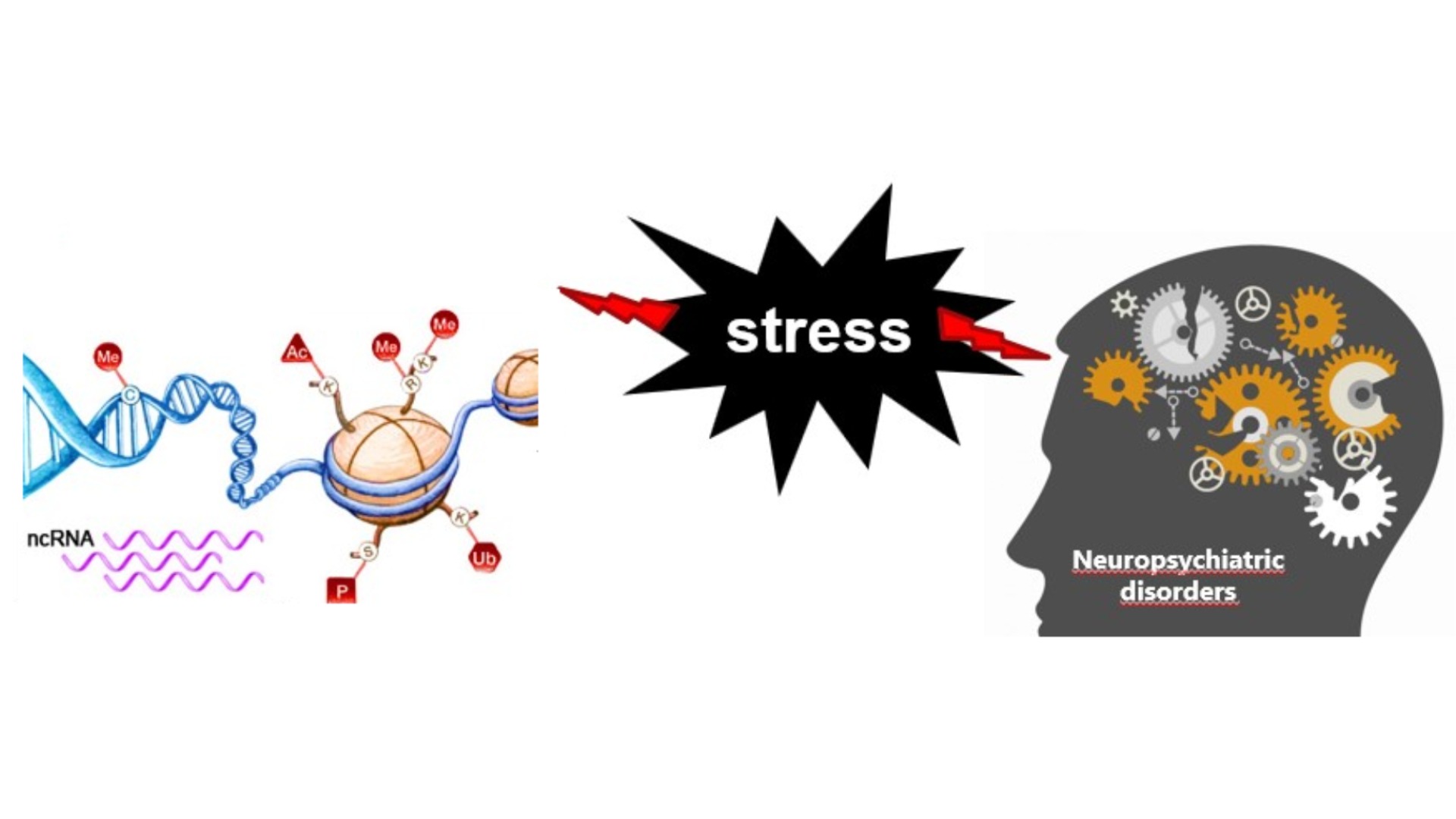
Epigenome and stress
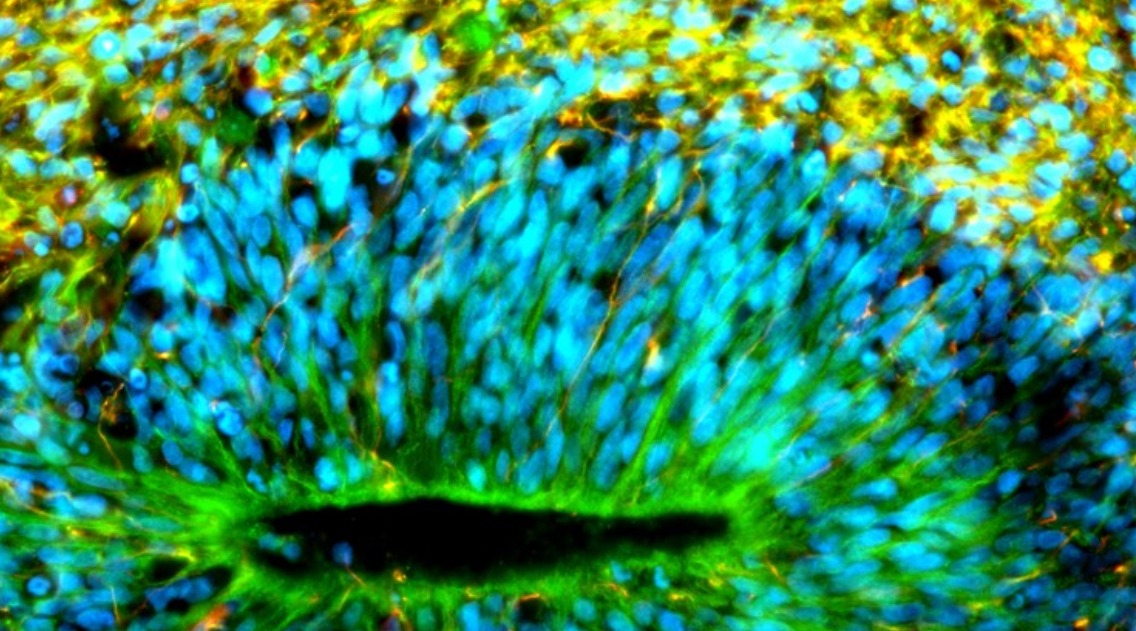
Stress pathways and neurodevelopmental disorders
Publications
2022
- Epigenetic priming of immune/inflammatory pathways activation and abnormal activity of cell cycle pathway in a perinatal model of white matter injury. 2022 Dec 13;13(12):1038. doi: 10.1038/s41419-022-05483-4. (associated to )
- CBP-HSF2 structural and functional interplay in Rubinstein-Taybi neurodevelopmental disorder.
- Immediate perturbation of DNA methylation upon acute prenatal alcohol exposure in the mouse developing brain cortex.
2021
- Gambogic acid and gambogenic acid induce a thiol-dependent heat shock response and disrupt the interaction between HSP90 and HSF1 or HSF2. Cell Stress Chaperones. 2021 Sep;26(5):819-833. doi: 10.1007/s12192-021-01222-4. Epub 2021 Jul 30. PMID: 34331200
- Role of heat shock transcription factor 2 in the NMDA-dependent neuroplasticity induced by chronic ethanol intake in mouse hippocampus.
2020
- The « HSF connection »: Pleiotropic regulation and activities of Heat Shock Factors shape pathophysiological brain development.
- Heat Shock Factor 2 Protects against Proteotoxicity by Maintaining Cell-Cell Adhesion.
2019
2018
- HSP27 is a partner of JAK2-STAT5 and a potential therapeutic target in myelofibrosis.
- Alcohol exposure promotes DNA methyltransferase DNMT3A upregulation through reactive oxygen species-dependent mechanisms. Miozzo F, Arnould H, de Thonel A, Schang AL, Sabéran-Djoneidi D, Baudry A, Schneider B, Mezger V. Cell Stress Chaperones. 2018 Jan;23(1):115-126. PMID: 28712054
- The impact of epigenomic next-generation sequencing approaches on our understanding of neuropsychiatric disorders. Schang AL, Sabéran-Djoneidi D, Mezger V. Clin Genet. 2018 Mar;93(3):467-480.. PMID: 28696507
2017
- Variations in brain defects result from cellular mosaicism in the activation of heat shock signalling. Ishii S, Torii M, Son AI, Rajendraprasad M, Morozov YM, Kawasawa YI, Salzberg AC, Fujimoto M, Brennand K, Nakai A, Mezger V, Gage FH, Rakic P, Hashimoto-Torii K. Nat Commun. 2017 May 2;8:15157. PMID: 28462912
- Methylomic changes during conversion to psychosis. Kebir O, Chaumette B, Rivollier F, Miozzo F, Lemieux Perreault LP, Barhdadi A, Provost S, Plaze M, Bourgin J; ICAAR team, Gaillard R, Mezger V, Dubé MP, Krebs MO. Mol Psychiatry. 2017 Apr;22(4):512-518. PMID: 27113994
2015
- HSFs, Stress Sensors and Sculptors of Transcription Compartments and Epigenetic Landscapes. Miozzo F, Sabéran-Djoneidi D, Mezger V. J Mol Biol. 2015 Dec 4;427(24):3793-816. Review. PMID: 26482101
2014
- Heat shock in the springtime. Morano KA, Sistonen L, Mezger V. Cell Stress Chaperones. 2014 Nov;19(6):753-61. PMID: 25199949
- Heat shock factor 2 is a stress-responsive mediator of neuronal migration defects in models of fetal alcohol syndrome. El Fatimy R, Miozzo F, Le Mouël A, Abane R, Schwendimann L, Sabéran-Djoneidi D, de Thonel A, Massaoudi I, Paslaru L, Hashimoto-Torii K, Christians E, Rakic P, Gressens P, Mezger V. EMBO Mol Med. 2014 Jul 15;6(8):1043-61. PMID: 25027850
- A novel nodal enhancer dependent on pluripotency factors and smad2/3 signaling conditions a regulatory switch during epiblast maturation. Papanayotou C, Benhaddou A, Camus A, Perea-Gomez A, Jouneau A, Mezger V, Langa F, Ott S, Sabéran-Djoneidi D, Collignon J. PLoS Biol. 2014 Jun 24;12(6):e1001890. PMID: 24960041
- Roles of heat shock factor 1 in neuronal response to fetal environmental risks and its relevance to brain disorders. Hashimoto-Torii K, Torii M, Fujimoto M, Nakai A, El Fatimy R, Mezger V, Ju MJ, Ishii S, Chao SH, Brennand KJ, Gage FH, Rakic P. Neuron. 2014 May 7;82(3):560-72. PMID: 24726381
- Early environmental factors, alteration of epigenetic marks and metabolic disease susceptibility. Portha B, Fournier A, Kioon MD, Mezger V, Movassat J. Biochimie. 2014 Feb;97:1-15. Review. PMID: 24139903
2012
- Transcriptional regulation of small HSP-HSF1 and beyond. de Thonel A, Le Mouël A, Mezger V. Int J Biochem Cell Biol. 2012 Oct;44(10):1593-612. Review. PMID: 22750029
2011
- Heat shock factor 2 is required for maintaining proteostasis against febrile-range thermal stress and polyglutamine aggregation. Shinkawa T, Tan K, Fujimoto M, Hayashida N, Yamamoto K, Takaki E, Takii R, Prakasam R, Inouye S, Mezger V, Nakai A. Mol Biol Cell. 2011 Oct;22(19):3571-83. PMID: 21813737
- Implication of heat shock factors in tumorigenesis: therapeutical potential. De Thonel A, Mezger V, Garrido C. Cancers (Basel). 2011 Mar 7;3(1):1158-81. PMID: 24212658
2010
- Roles of heat shock factors in gametogenesis and development. Abane R, Mezger V. FEBS J. 2010 Oct;277(20):4150-72. Review. PMID: 20945531
Team members
Funding
Our research is funded by

Contact
Valérie Mezger, valerie.mezger@u-paris.fr
Applications of motivated student and postdoc are welcome. Do not hesitate to contact us.
Read more
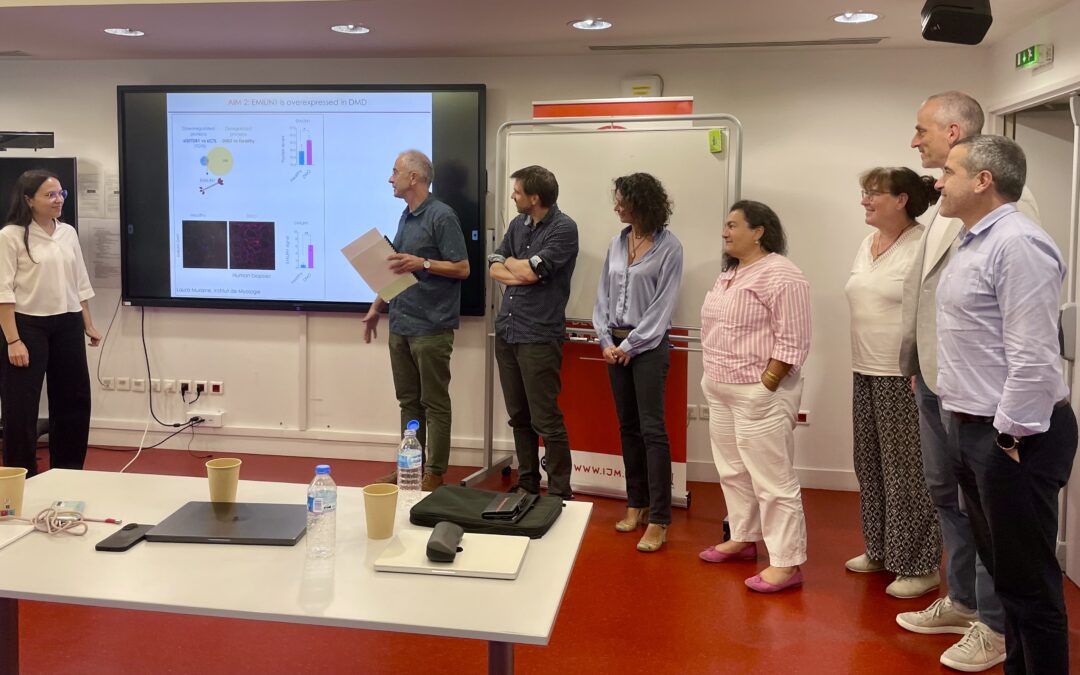
Congratulations to Dr. Maeva Zamperoni!
On September 15, 2025, Maeva successfully defended her thesis: “Role of the lysine methyltransferase SETDB1 in TGFβ-induced fibrosis in Duchenne Muscular Dystrophy (DMD).”Maeva and the jury members: Pascal Maire, Nicolas Reynoird, Sestina Falcone, Frédérique...
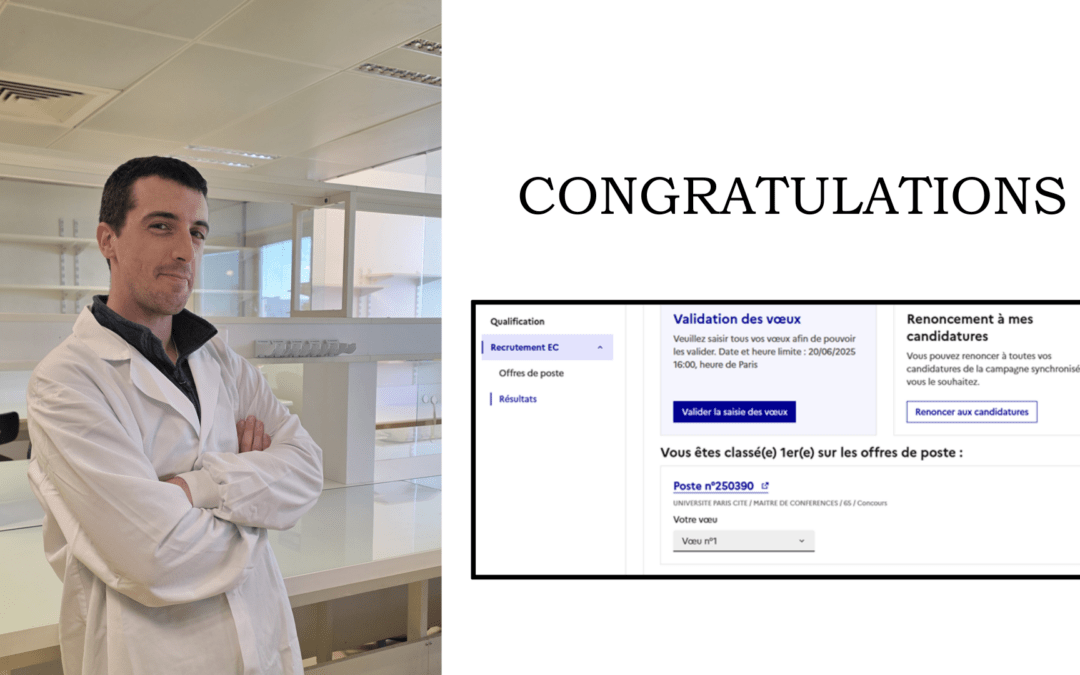
Congratulations to Jérémy, newly appointed Associate Professor!
We are delighted to announce Jérémy Berthelet's success in the Assistant Professor competition!On September 1, 2025, Jérémy officially joined our laboratory as a civil servant lecturer-researcher (trainee). This position is an important step, not only in his career,...

Congratulations to Souhila, promoted full Professor !
We are delighted to announce the success of Souhila MEDJKANE, who has been promoted to full Professor!On September 1, 2025, Souhila was officially promoted to Professor. This is a major milestone in her career, and a source of great pride for our team and the teaching...

4th year PhD fellowships for Anaëlle
Congratulations to Anaëlle Azogui for obtaining a 4th year PhD fellowships from the "Fondation pour la recherche sur le cancer" (Fondation ARC). Read more
